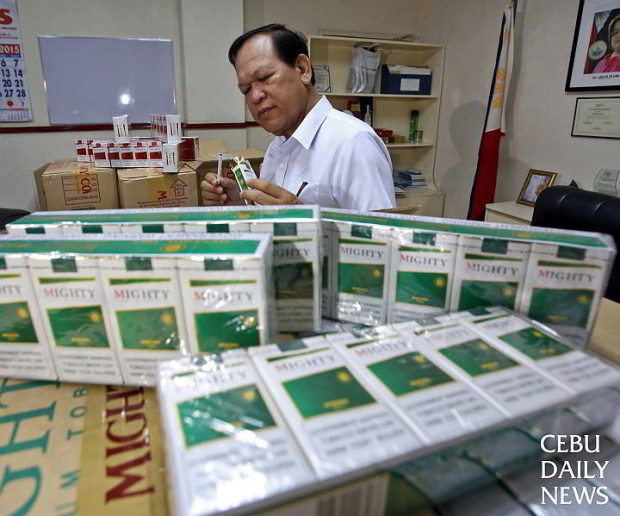Mighty Corp. was counterfeiting its own tax-paid stamps and was likely taking advantage of alleged unauthorized overprinting by the government-controlled printer that churns out cigarette tax stamps, the Bureau of Internal Revenue (BIR) and Irsis Corp. said in separate reports last year.
Last December, Deputy Commissioner Jesus Clint O. Aranas submitted to Internal Revenue Commissioner Caesar R. Dulay a progress report on the investigation of a task force looking into APO Production Unit Inc.’s alleged overprinting of the internal revenue stamps being affixed to cigarette packs.
Tax stamps are proof that the proper excise taxes under the sin tax reform law has been paid by cigarette manufacturers. However, Dulay himself admitted that there was a proliferation of counterfeit stamps, depriving the government of billions of pesos in revenue.
Preliminary findings detailed in the Aranas report dated Dec. 19 last year included lapses in ensuring no fraudulent activity in the production of tax stamps.
For one, while stamp production was done 24 hours a day, seven days a week, the task force found that a full-time revenue officer on the premises was present only during office hours.
Defective stamps
Also, there was a “significant number” of stamps eventually declared “defected,” [defective] by APO, but there was a lack of internal control measures that should have determined where these defective stamps should go, Aranas said.
From 2014 to 2016, more than 13.5 million stamps were declared defective, although further investigation showed that the actual number could climb to 37.4 million, according to the report.
Besides the defective stamps, there were also “bad orders” that cigarette manufacturers returned but kept within APO premises.
In its investigation of the proliferation of fake stamps, the task force found out that “several QR codes found in the fake stamps were observed to be regenerated or, in layman’s term, reused multiple times.”
A QR code is a two-dimensional barcode containing a unique identifier code printed on the tax stamp pertinent to the single cigarette pack bearing the stamp. Hence, a tax stamp ideally bears a unique QR code.
But “according to sources that the task force interviewed under strict confidentiality, the fact that QR codes were regenerated or reused multiple times means that they were used several times as well to produce stamps,” the report read.
Reused QR codes
The report said “the QR codes that were regenerated multiple times were traced or belonged to only one company, Mighty Corp.”
“Based on the same sources, more than 500 records of invalid stamps contain QR codes that were part of orders of Mighty Corp. in 2015,” it added.
The task force also found that Asa Color Trading Corp., which supplies the silver ink being used by APO in the tax stamps’ silver strip, incidentally also supplies Mighty’s ink.
Also, United Graphic Expression Corp., the contract supplier of base printing of tax stamps to APO, is also Mighty’s supplier, the report said.
The task force likewise cited a Commission on Audit report that showed APO’s inventory report in 2014 was not reconciled with the independent auditor’s report. “The deficiency in records may include raw materials used in the production of internal revenue stamps tax, which may be a source of leakage.”
In a separate confidential report dated Dec. 19, Irsis Corp.—the consortium that handles the supply and delivery of security features as well as the ordering and monitoring system for the tax stamp system—said that “as Mighty Corp. is the only organization that has access to its ordered and released tax-paid stamps, it can be concluded that Mighty Corp. counterfeits its own tax-paid stamps and uses these fake stamps on illicit packs.”
Irsis noted that there was also a proliferation of fake cigarettes, and all brands, including those of Mighty, PMFTC Inc., JTI and British American Tobacco had counterfeits.
But “while fake PMFTC and other brands are present in the market, fake stamps are more prevalent on Mighty brands,” Irsis said.
